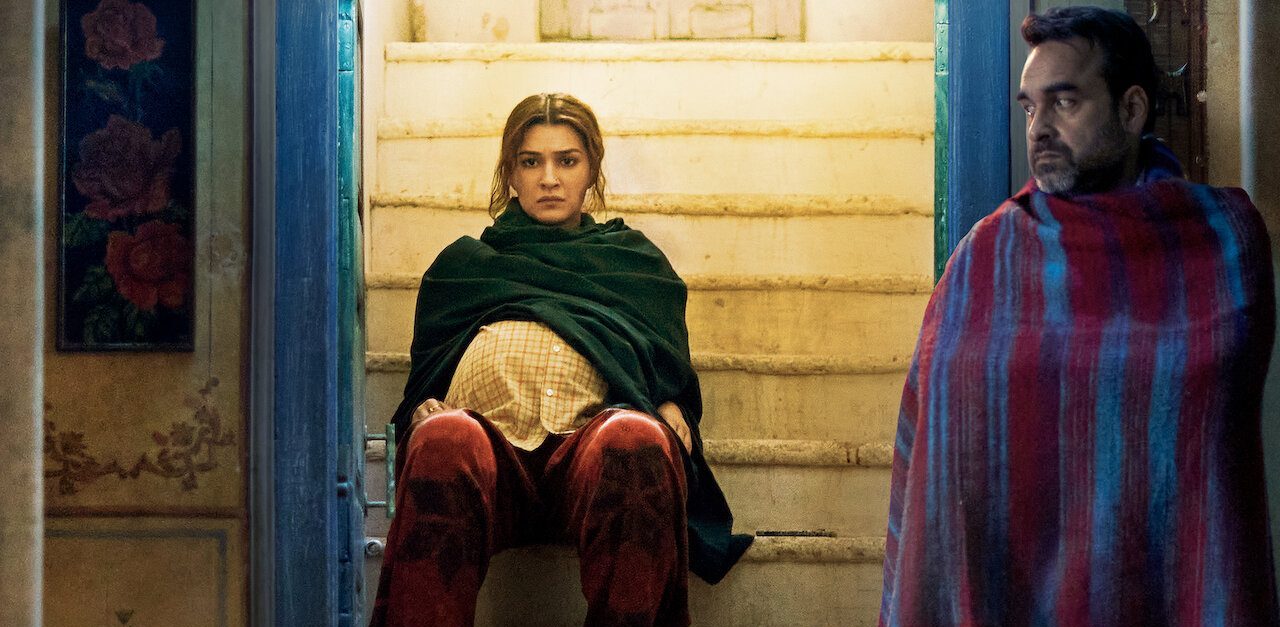In a smart marketing gimmick, the makers of the new Netflix film “Mimi” released it 4 days before its official streaming debut. While this day is marked by lead Kirti Sanon’s birthday, the early delivery of this pregnancy comedy rattled the brains of pirate websites that leaked the film prior to its release. However, this piece of information is actually the only interesting thing about this surrogacy dramedy that so gleefully uses its ‘Quirky heartland trope,’ that it ends up making fun of topics that needed a more serious tone. Inversely, it also takes a self-serious approach to those moments that could have used more subtlety.
People to blame here are the usual culprits. Director Laxman Utekar and co-writer Rohan Shankar seem to have not learned a thing from their incredibly ill-conceived 2019 comedy “Luka Chuppi.” That film explored the taboo subject of live-in relationships with a pinch of salty, half-conceived ideas. Similarly, in “Mimi” the writer-director collaborate to adapt National Award-winning 2011 Marathi film “Mala Aai Vahhaychy!” by giving it a North-Indian touch.
The tale is now set in a small town in Rajasthan where 25-year-old Mimi (Kirti Sanon) dreams of becoming a Bollywood star. To make her dream come true, she dances at random local shows accompanied by her singer best friend played by Sai Tamhankar. During one of her shows, American couple Summer (Evelyn Edwards) and John (Aidan Whytock) notice her dancing. They are instantly attracted to her persona and decide to pursue her to be a surrogate mother for their child. Their reasons are explicitly described as her being healthy with a perfect fit body, thus serving as (quoting the film’s own metaphor), the best ‘farm’ for their ‘seed.’
Driver Bhanu (played by a now typecast Pankaj Tripathi) takes it upon himself to convince the feisty young girl of being the mother to the couple’s child. Initially awkwardness aside, he is easily able to get her to take it upon herself to give the couple their last hope for happiness. The reasons for both Mimi and Bhanu partaking in this ordeal are pretty evident. The couple is offering them a large sum of money and since both of them don’t wish to lose this opportunity, they agree.
The rest of the film plays out around Mimi’s pregnancy, the couple’s parental jitters, and a wholly ill-conceived third act that uses its societal norms to step back rather than move forward. In a film that has the potential to make a statement, escaping from smoldering a critic on society’s obsession with perfection, a woman’s choice over her body, and what it really means to be a parent, feels like a cop-out. The film’s inept writing and weirdly inert narrative beats fail to deliver a clear and concise message, diluting the film’s potential with a problematic and conservative stance on its own progressive ideas.
It’s like the writer-director duo is so confused by their subject that they crash-land into their need to evoke complex issues with a light touch. The consequence of this futile exercise is some really problematic takeaways. Since the film’s trailer almost ruins the entire thing, it wouldn’t be wrong of me to briefly discuss its many flaws.
One of the gravest of the issues I had with the film was how it handles Mimi’s character post the couple’s decision to abandon their baby because the initial test shows that it has down syndrome. Up until this point, Mimi is portrayed as an ambitious girl who is partaking in the whole gamble just because she can make a quick buck. However, post the couple’s runaway scenario, she is shown as this timid damsel in distress who chooses to keep the baby and raise him over aborting. While I don’t want to shoehorn my own moral compass into the situation, this ploy feels incredibly far-fetched and thrives a mixed message to the audience.
I like the fact that the film wants to normalize surrogacy and adoption, but it is so ill-equipped with tools at its disposal that those ideas are just merely thrown in. More flaws include how it completely villainizes the American couple by keeping us away from their point of view. The film thus borderlines propaganda that nearly crams up its idea of real motherhood by scattering other things out of the window. Bhanu’s character and his actions are neatly bowed with a self-addressed ‘driver-philosophy’ which is only brought to life by Panjak Tripathi’s charm. In any other actor’s hand, the character would feel so incredibly unbelievable that it would end up derailing the entire film.
Talking about the acting department, Veteran actors Manoj Pahwa and Supriya Pathak play Mimi’s parents. While the two actors can carry an entire film alone, they are marred of any kind of semblance with superficial character writing. Marathi actor Sai Tamhankar plays a Muslim woman living with her father post a divorce. She gets only one sequence to shine. The rest of her arc is left under the wraps and the communal tension is never explored well.
For a film that shouts progressive from the very first sequence, Mimi feels like it’s taking us few years backward. Take the scene where Mimi’s white baby becomes the talk of the town. Townsfolk flok up to her home to enquire and get advice from Bhanu’s character (who is allegedly declared the father) about how to conceive a baby that is fair. For a film that is trying to dismantle our color bias, I am not sure what these scenes are supposed to mean.
Rating: 1.5/5
Read More: Best Motherhood Movies on Netflix

